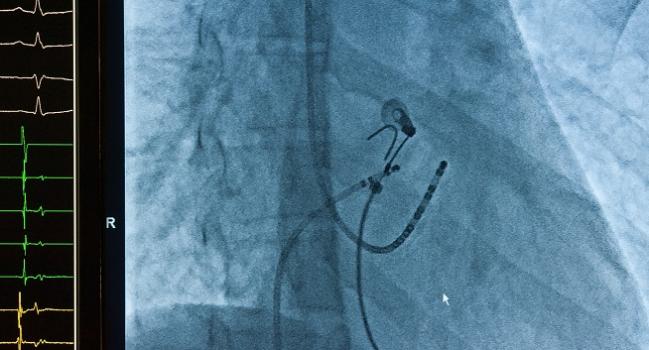Catheter Ablation Boosts Outcomes in Patients With A-fib and Heart Failure: Meta-analysis
However, the magnitude of the benefits over drug therapy could be overestimated, one expert cautions.

In patients with heart failure and A-fib, catheter ablation seems to provide better outcomes than does treatment with either rhythm or rate-control medication, a new meta-analysis of randomized data shows.
Ablation was associated with reductions in all-cause mortality and heart failure hospitalizations, as well as improvements in LV function, functional capacity, and quality of life in pooled results from six trials, researchers led by Mohit Turagam, MD, and Jalaj Garg, MD (Icahn School of Medicine at Mount Sinai, New York, NY), report in their paper published December 24, 2018, online ahead of print in Annals of Internal Medicine.
Major adverse events were more frequent with ablation, although the difference didn’t reach statistical significance (7.2% vs 3.8%; RR 1.68; 95% CI 0.58-4.85).
“These data are pretty compelling that we should aggressively try to keep these patients in sinus rhythm,” senior author Vivek Reddy, MD (Icahn School of Medicine at Mount Sinai), told TCTMD.
He said he’s seen an uptick in use of ablation in patients with A-fib and heart failure since the results of the largest trial included in the meta-analysis—CASTLE-AF—came out last year, “but certainly not commensurate with the amount of data that’s out there.”
Considering the impact on hard clinical outcomes, LVEF, functional capacity, and quality of life, “you’d expect a lot more patients with [A-fib and heart failure] to be referred for ablation, and that’s not what we’re seeing,” Reddy said. “So, while the data are quite compelling, I think that many cardiologists don’t know about the data, or even if they do, they’ve not incorporated it into their practice.”
Atrial fibrillation frequently occurs in patients with heart failure, and the two conditions together “lead to atrial structural and electrical remodeling and progression of paroxysmal to persistent atrial fibrillation, perpetuating a vicious cycle of impaired left ventricular filling, contractility, and cardiac output,” the researchers explain.
Catheter ablation is an established approach for symptomatic A-fib that is not responsive to medical therapy, and there is evidence from recent randomized trials that it is safe and effective in patients with heart failure.
For the meta-analysis, the investigators looked at data from six trials with a total of 775 patients—a 41-patient Scottish trial, ARC-HF, CAMTAF, AATAC, CAMERA-MRI, and CASTLE-AF. Mean patient age ranged from 55 to 64. The main cause of heart failure across trials was ischemic cardiomyopathy, and the mean LVEF was 28.3%. Five trials included only patients with persistent A-fib, whereas half of patients in CASTLE-AF had paroxysmal A-fib.
Radiofrequency catheters were used for ablation in all trials. Drug therapy included rate control exclusively in four trials, rhythm control with amiodarone in AATAC, and either rate or rhythm control in CASTLE-AF.
Compared with drug therapy, ablation was associated with lower rates of all-cause mortality (9.0% vs 17.6%; RR 0.52; 95% CI 0.33-0.81) and heart failure hospitalizations (16.4% vs 27.6%; RR 0.60; 95% CI 0.39-0.93).
The ablation group also saw greater improvements in LVEF (mean between-group difference of 6.95%), 6-minute walk test distance (mean difference of 20.93 m), and peak oxygen consumption (mean difference of 3.17 mL/kg/min). The improvement in scores on the Minnesota Living with Heart Failure Questionnaire was greater by an average of 9.02 points in the ablation versus drug therapy group. In addition, A-fib burden was reduced to greater extent with ablation.
The results were mostly driven by the CASTLE-AF trial, which accounted for nearly half of all patients, according to the investigators.
Commenting for TCTMD, Adrian Hernandez, MD (Duke University School of Medicine, Durham, NC), said meta-analyses are good for synthesizing data from different trials, but he pointed out that when the results are driven by one study, the observed benefits may be overestimated. That’s especially true when you consider the fact that the types of patients with heart failure typically seen in practice tend to be older and have more comorbidities than the patients included in these trials, he said.
Another issue to consider, according to Hernandez, is “that when you look at the total number of events here and the total number of patients studied, it’s still relatively small compared to our other heart failure trials that we’re used to seeing.”
Nevertheless, the meta-analysis “is overall supportive that there is a benefit [from ablation],” even if the magnitude of the benefit is smaller than observed, he said.
“If there is a patient with heart failure where atrial fibrillation is a frequent problem that is making the heart failure harder to treat, it certainly supports that catheter ablation may be helpful for both the atrial fibrillation and heart failure,” Hernandez said.
But considering the fact that up to 40% of patients with heart failure will have A-fib, “a meta-analysis that has 775 patients driven by one trial does not necessarily translate into this [being] something that we should routinely do across all patients with atrial fibrillation and heart failure,” he said. “You still need to be selective in terms of understanding how the benefits and risks can apply for an individual patient.”
Hernandez noted that ablation technology continues to improve, which could result in better safety and efficacy in the future. Thus, he said, additional studies will be needed to address the benefits and risks of ablation.
Reddy said more data is what’s ultimately needed to convince cardiologists of the benefits of ablation in patients with heart failure, noting that there are at least four ongoing trials that are exploring the issue: RAFT-AF, CATCH-AF, AFARC-LVF, and AMICA.
Todd Neale is the Associate News Editor for TCTMD and a Senior Medical Journalist. He got his start in journalism at …
Read Full BioSources
Turagam MK, Garg J, Whang W, et al. Catheter ablation of atrial fibrillation in patients with heart failure: a meta-analysis of randomized controlled trials. Ann Intern Med. 2018;Epub ahead of print.
Disclosures
- Turagam and Garg report no relevant conflicts of interest.


Comments